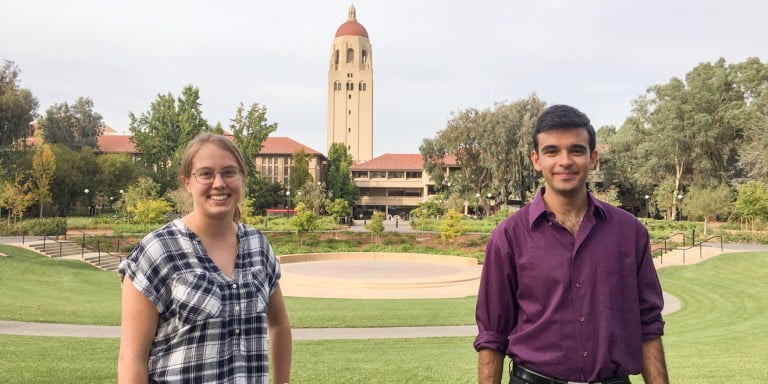A new campus publication intended to challenge campus liberalism, The Stanford Sphere, launched this week.
The group, which published its first piece on Monday, is led by Ravi Veriah Jacques ’20 and Christina Egerstrom ’17, a coterminal student in journalism.
Upon arriving at Stanford last year, Jacques noticed the Stanford Review publishing provocative pieces from the political right. But he missed the voices of contrarian leftists. That’s when he decided he could help fill what he saw as a gap in Stanford’s media scene.
What Jacques originally envisioned as a socialist paper eventually developed into a more independent-minded publication. As head editor, he is open to any article that complicates dialogue, particularly ones that challenge the “liberal consensus” he sees on campus.
Examining media from the 1960s, Jacques observed a wide array of newspapers in which leftists of all bents argued with each other. Now, however, he feels campus opinions have coalesced around mainstream American liberal views on many issues, foreclosing debate. Jacques hopes his publication will reopen this conversation.
While the current Sphere staff leans left, Jacques has also invited right-wing conservative writers to join the publication. In doing so, he especially hopes to hear ideas that he disagrees with.
Jacques said his embrace of contrary views developed only recently. Reflecting on his freshman self, Jacques felt irritated by his old approach to political discourse.
“I realized particularly how I condemned Trump supporters and anyone of differing opinions,” Jacques explained. “I’ve come to really dislike dogma, particularly because I was very dogmatic myself.”
Jacques’ experiences in political advocacy also made him yearn for more dialogue at Stanford. Though campus protesters are sometimes viewed as “all talk, no action,” Jacques saw the opposite.
“I was very heavily involved in activism last year,” he said, “There seemed to be a lot of action, and not so much discussion or thinking. We’d have a half an hour meeting, and then we’d suddenly be out there shouting.”
Nevertheless, others testified that places already exist on campus where students can engage with opposing viewpoints.
Gabe Rosen ’19, president of the Stanford Democrats, has seen fruitful dialogue on campus, particularly through Stanford’s political organizations.
“When it comes to the institutions on campus, whether it’s the Democrats, Republicans or other entities that operate similarly to parties, like the International Socialist Organization or similar groups, it seems there is room to engage directly with each other,” Rosen said.
However, Rosen said he appreciates the importance of new mediums to engage with sensitive issues. In his opinion, productive political exchange involves hearing out ideas that one might find emotionally challenging.
Rosen posed a hypothetical example of a hallmate who holds controversial opinions.
“It’s important that people don’t feel physically uncomfortable by the presence of someone who has controversial views like that, even if the position of that speech could directly harm another person,” Rosen said. “It’s vital that we create an atmosphere where you can have such different opinions in close proximity. But there needs to be mutual respect. It can’t just be one person being a contrarian making things very difficult for other people.”
Another student, Isabelle Carpenter ’20, a Stanford Sphere writer, criticized those who seem to argue with the intention of provoking others. Carpenter said she also noticed that when her Stanford classmates express views that contradict the conventional left-of-center thinking that dominates campus discussion, they often feel compelled to qualify their statements.
For her, both behaviors result from misunderstandings of what it means to be politically correct.
“I think political correctness absolutely has a place,” Carpenter explained, “because all political correctness is, is respecting the person that you are addressing. However, I think that many have a skewed idea about what political correctness is. Some people think that it means you only have to behave in this one way that everyone deems okay. And other people think it’s just silencing.”
Jacques said he is especially aware of such silencing at Stanford due to identity politics: For him, issues around identity are some of the hardest topics on which to challenge consensus thinking. Social justice, in his view, must be tempered by an understanding of opposing ideas.
“A primary aim of The Sphere is to host nuanced conversations about identity,” he said. “Perhaps to express concern about certain strands of feminism, whether they be too moderate or whether they be too radical, about race relations in America.”
Although The Sphere will focus on President Trump and American domestic politics, it will aim to broaden its scope to foreign issues as well.
The Sphere intends to publish ten pieces before the end of the quarter. Students who submit well-written responses to previously published articles may have their work published online. Jacques hopes this model will help shed light on the Stanford community’s full range of political thought.
“The illusion has kind of emerged over recent years that diversity of opinion only exists on the right,” he said, “that there are neo-nazis and traditional conservatives—whereas on the left there are liberals—and some crazy communists somewhere. Of course, it’s more complicated than that.”
Contact Mini Racker at mracker ‘at’ stanford.edu.
